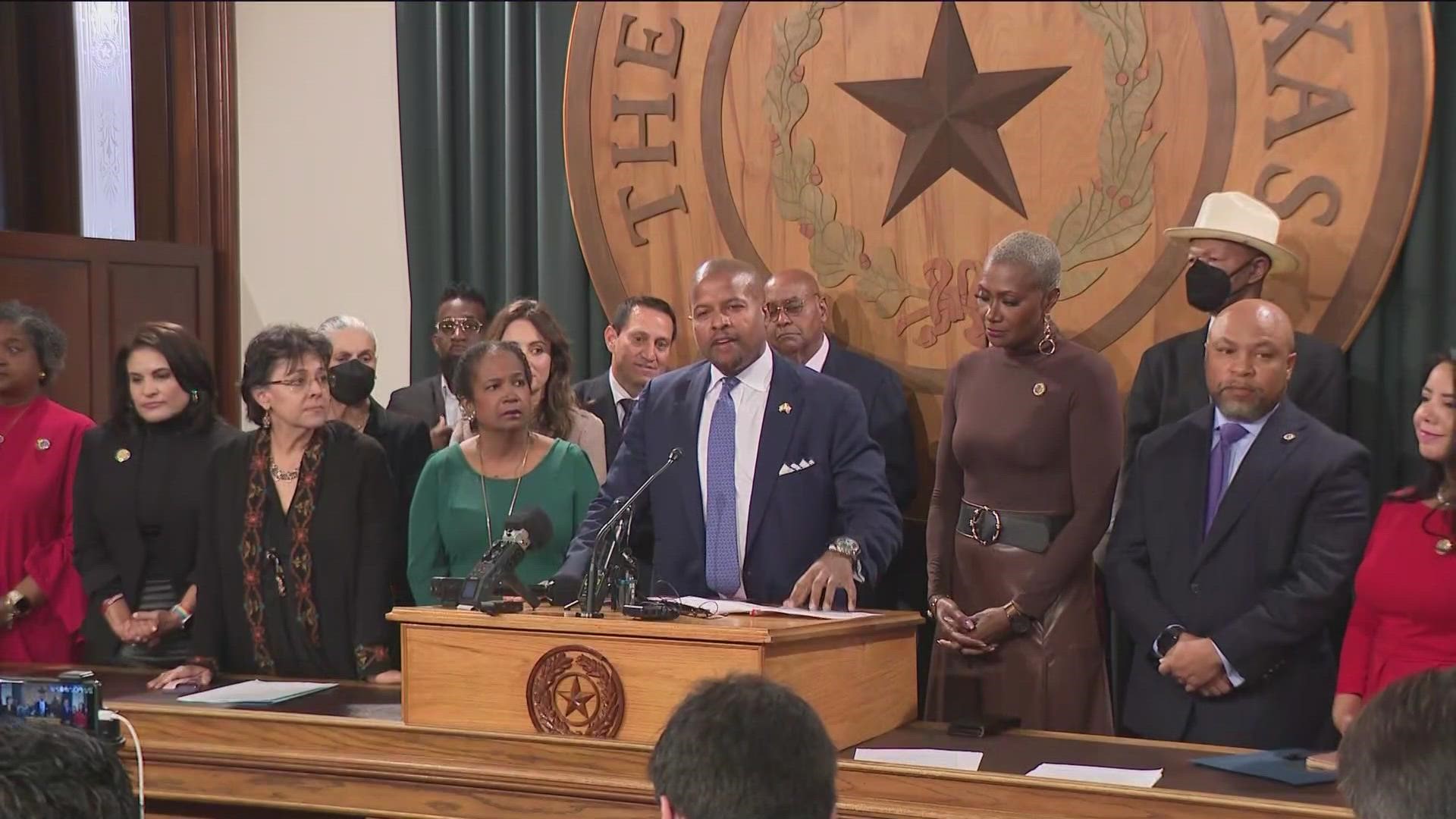TEXAS, USA — Black and Latino lawmakers decried Gov. Greg Abbott’s recent order to Texas universities and state agencies to strike down diversity, equity and inclusion policies from their hiring practices.
At a press conference Tuesday morning at the state Capitol, lawmakers in the Texas Legislative Black Caucus and the Mexican American Legislative Caucus, representatives with the Texas chapter of the NAACP and faith leaders across the state said the governor’s assertion that DEI policies are illegal is incorrect, a “lie” and a “diversion” from addressing the issues facing Texans.
They also called on the National Football League, National Basketball Association, Major League Baseball and the NCAA to not host championship games in the state until the governor rescinds his guidance to agencies and universities.
Lawmakers said Abbott’s values do not reflect those of Texas and accused the governor of using people of color in a political fight with Florida Gov. Ron DeSantis to be the most “Trumpian” politician.
“We will not be complicit in his attempt to use minorities as pawns for his political game,” said state Rep. Ron Reynolds, D-Missouri City, chair of the Texas Legislative Black Caucus.
In a memo sent to state agencies Feb. 6 and first reported by The Texas Tribune, Abbott’s chief of staff, Gardner Pate, said that diversity, equity and inclusion policies used to screen or vet job candidates are illegal and state agency heads have a “duty” to follow the law. Since then, some labor and civil rights attorneys have said the governor’s office is mischaracterizing anti-discrimination laws.
On Monday, Lt. Gov. Dan Patrick also announced that eliminating “discriminatory diversity, equity and inclusion policies in higher education” is one of his top legislative priorities.
Reynolds called these priorities misguided and an appeal to a far-right base in the Republican Party.
“They are code for anti-Black, anti-Asian, anti-LGBTQ, the majority of the state,” Reynolds said. “They are slapping us in the face and saying you’re not welcome here anymore.”
Diversity, equity and inclusion policies are developed to provide guidance in workplaces, government offices and college campuses on how to increase representation and foster an environment that emphasizes fair treatment to groups that have historically faced discrimination. DEI policies can include providing resources for underrepresented groups like people with disabilities, LGBTQ people and veterans. In hiring, they can include setting diversity goals or setting thresholds to ensure diverse candidate pools.
“These offices don’t exist to be racist against white people,” said state Rep. Sheryl Cole, D-Austin. “They exist to foster, affirm, engage and strengthen diverse communities because ultimately our diversity is our strength.”
Recently, Texas Tech University issued a university-wide review of its hiring practices after a conservative advocacy group criticized the biology department for rating job candidates’ commitment to diversity and inclusion efforts.
Most Texas university and state agency leaders have largely remained silent about the letter from the governor’s office. University of Houston System Chancellor Renu Khator characterized the letter as a “reminder” to follow state and federal law.
Reynolds said higher education leaders in the state are afraid to speak out on the issue, adding that he’s received texts from many who said they did not want to publicly voice their concerns and appreciated the caucus being outspoken in support of diversity.
“They feel like they’re going to be the target and they may lose their job or lose funding,” he said.
The governor’s directive represents the latest effort by Republican leaders fighting against policies and academic disciplines that they have described as indoctrination of liberal politics within higher education. Pate said in his letter that DEI policies illegally discriminate against certain demographic groups — though he did not specify which ones — and are being used illegally to “proactively promote discrimination in the workplace.”
President Lyndon B. Johnson prohibited employment discrimination based on race, sex, religion and national origin as part of the 1964 Civil Rights Act during a time when people of color, especially Black Americans, were excluded from higher-wage jobs and other opportunities based on race.
On Tuesday, lawmakers with the Black and Mexican American caucuses argued that as the state becomes more diverse, the workforce is demanding more diverse workplaces and employers who understand and foster those ideals.
“If we remove these opportunities by removing DEI, where will that take our economy?” said Rep. Victoria Neave Criado, D-Dallas.
This story comes from our KHOU 11 News partners at The Texas Tribune, a nonprofit, nonpartisan media organization that informs Texans - and engages with them - about public policy, politics, government, and statewide issues.

